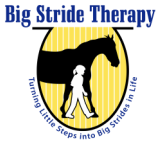What is Adaptive Riding
Adaptive horseback riding also known as Therapeutic riding, is the use of horses and equine-assisted activities in order to achieve goals that enhance physical, emotional, social, cognitive, behavioral and educational skills for people who have disabilities.
Students learn riding skills in an adaptive environment taught by a licensed instructor. It not only focuses on riding skills but also the development of a relationship between horse and rider. It uses a team approach in order to provide treatment for the individual with the guidance of the instructor. Benefits individuals with Physical, Psychological or Developmental needs.
Students learn riding skills in an adaptive environment taught by a licensed instructor. It not only focuses on riding skills but also the development of a relationship between horse and rider. It uses a team approach in order to provide treatment for the individual with the guidance of the instructor. Benefits individuals with Physical, Psychological or Developmental needs.
|
There is a very wide variety of disabilities that can benefit from the
therapy provided through horseback riding including:
|
Benefits:
|
